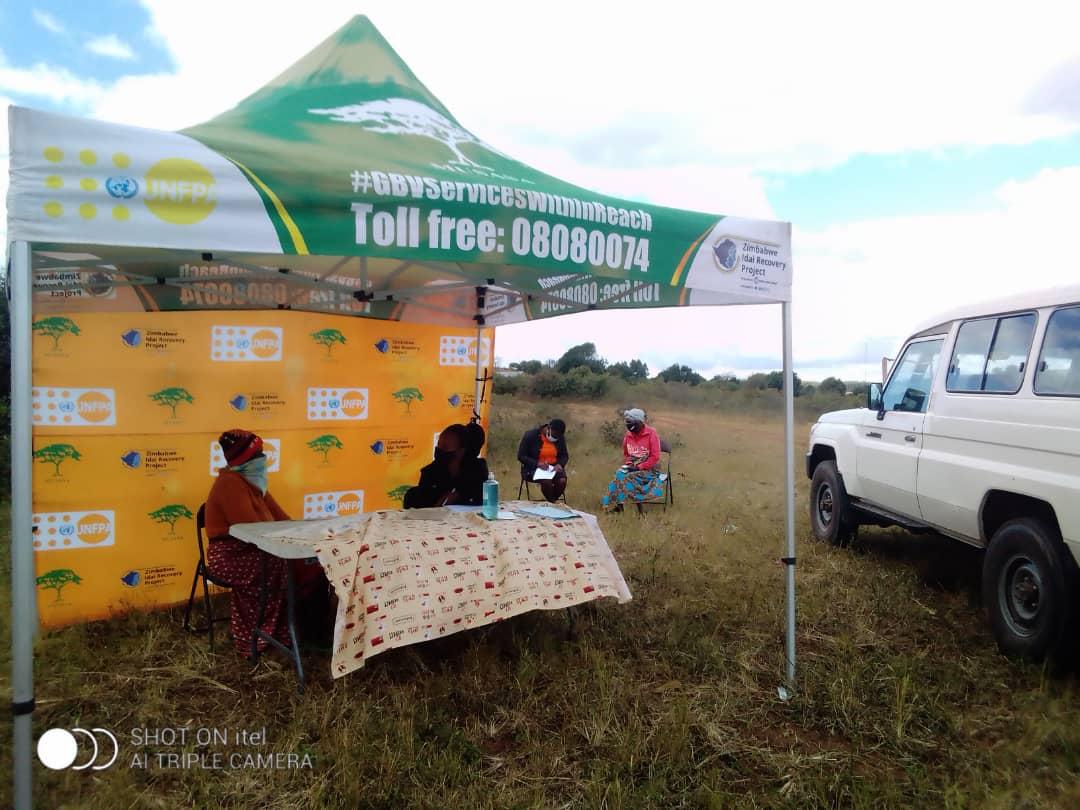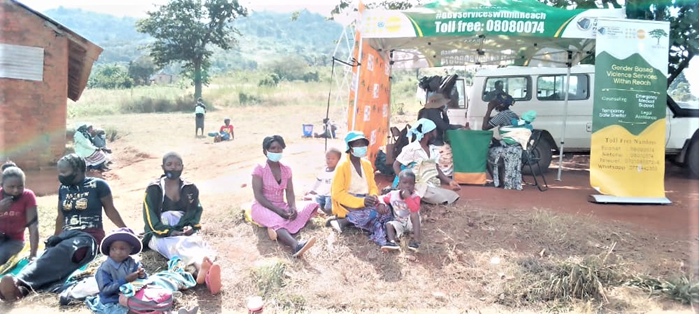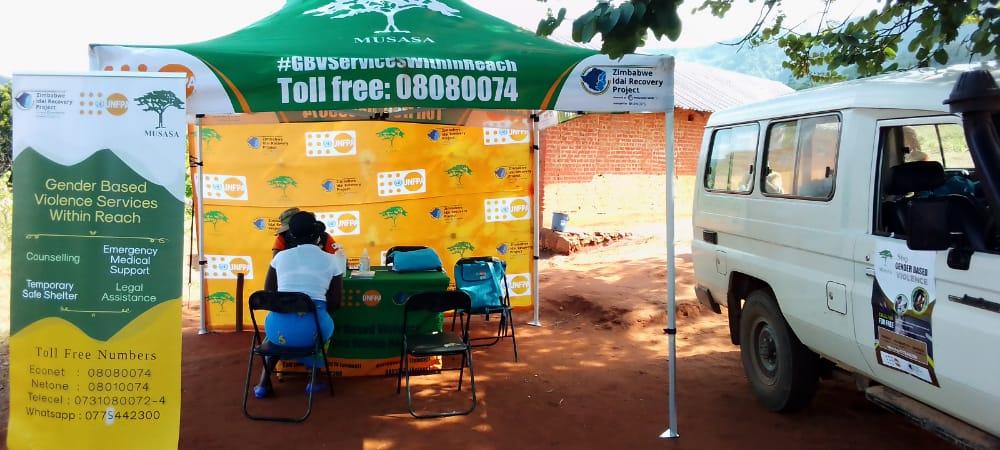Harare, Zimbabwe, 21 October, 2021 – The World Bank has recognised the United Nations Population Fund (UNFPA) Zimbabwe for its innovative work in responding to and preventing Gender Based Violence in the cyclone affected districts of Chipinge and Chimanimani under the Zimbabwe Idai Recovery Project (ZIRP).
Funded by The World Bank, ZIRP is a three-year response to the devastation left by Cyclone Idai in March 2019. It supports inter-sector post cyclone recovery initiatives, through resilience building efforts in worst affected areas in the context of a humanitarian–development nexus.
ZIRP is made up of three integrated and mutually reinforcing components: providing immediate support for cyclone recovery; enabling medium-term cyclone recovery and resilience-building; and providing project management and technical assistance, through a multi-sectoral approach.
The project is managed by the United Nations Office for Project Services (UNOPS) as the direct fund recipient and implemented by different agencies who have expertise in various sectors such as food security and livelihoods, health, education, community infrastructure, migration, GBV risk mitigation and essential service provision. As such, implementation is by Food and Agriculture Organization (FAO), International Organisation for Migration, United Nations Population Fund (UNFPA), United Nations Children’s Fund (UNICEF), UNOPS, World Food Programme (WFP) and World Health Organization (WHO), agencies that act as sub-component technical leads.

“In early project implementation, we noted how there was a need to enhance our project in the provision of relief and pathways for persons affected by Gender-Based Violence or Sexual Exploitation in the aftermath of the cyclone. We engaged with UNFPA based on their comparative advantage and knowledge in this area, and we are pleased at how this collaboration is assisting the community particularly during this pandemic period where incidences of GBV have been on the rise. We encourage communities to continue to access these services,” said Nicholas Callender, ZIRP co Task Team Leader and Disaster Risk Management Specialist.
UNFPA joined the multi-sectoral team within the ZIRP programme in July 2020 to ensure delivery of GBV essential services and GBV risk mitigation in Chimanimani and Chipinge. In view of the increased needs for GBV risk mitigation and response, and the critical necessity to ensure continuation of GBV essential services in the ZIRP target districts, UNFPA support in essential service provision will be in place through December 2022, through ZIRP financing.
““We greatly appreciate the effort to ensure the wellbeing of the most vulnerable women and girls in Cyclone Idai recovering areas. We value the great partnership with the World Bank and their recognition of our work on GBV prevention and response,” said UNFPA Country Representative Dr. Esther Muia.
Under the ZIRP technical assistance component, UNFPA works in strengthening resilient systems and structures in place to avert and respond to GBV in the cyclone targeted areas. Specifically, UNFPA plays a critical role in strengthening monitoring, referral, and response to GBV and increasing availability of multi-sectoral services for GBV response.
One key intervention is the delivery of GBV mobile services in remote and hard to reach areas, through the mobile One Stop Centre (OSC) model run by multi sectoral outreach teams composed of specialized counsellors, paralegal officers, working in close coordination with nurses and police victim friendly units.
Provision of mobile OSC services is integrated within the broader mobile clinics model, led by WHO. Within this component, UNFPA has provided technical assistance to the WHO team on the ground by training mobile clinic medical staff on clinical management of rape, in order to ensure continuous provision of timely services. Teams are also trained to apply the survivor-centred approach, which includes principles of respect, confidentiality, privacy and non-discrimination.
As part of the programme, 13 health care personnel, operational within the mobile clinics were trained on clinical management of rape, while 30 paramedical personnel were sensitized on GBV. The integration within mobile health clinics has enhanced GBV service uptake, as the mobile health clinics works as an entry point to GBV survivors who might access the clinic for other reasons. Survivors of GBV, both male and females, have embraced the model. They appreciate how the OSC has been able to bring a comprehensive package of expertise under one roof and, on wheels, reaching them in the most hard-to-reach areas. The mobile OSC model has therefore proved to be highly effective in enhancing service uptake in remote and hard to reach areas, including during the COVID19 lockdown.

Another key intervention under ZIRP is community-based GBV surveillance and referral strengthening through community health workers known as Behaviour Change Facilitators (BCFs) who are trained in integrated Sexual Reproductive Health and Rights/HIV/GBV prevention. BCFs work closely with direct service providers on the ground, to ensure timely referrals and access to life-saving services for survivors. Within the ZIRP, BCFs work in close coordination with other sector specific cadres such as the village health workers and agriculture extension workers to ensure integration of GBV information on referral pathways into their respective awareness programmes.
During the COVID19 protracted lockdowns, thanks to the joint efforts of the co-leads of the national GBV sub cluster, UNFPA and Ministry of Women Affairs, Community, Small and Medium Enterprise Development, BCFs were recognized among essential service providers. This enabled BCFs to continue conducting GBV surveillance and facilitate referrals to essential services for GBV survivors among communities. They were also assisted with data and airtime packages, to ensure two-way communication with the GBV National and the ZIRP hotlines. Community based cadres have therefore functioned as a critical resource at community level.
UNFPA also provides cross support to other ZIRP involved UN recipient agencies to build awareness and capacity on GBV risk mitigation and referral pathways to integrate GBV action in humanitarian response.

“GBV is not only the business of GBV specialized actors, and it is important that all sectors play their role to ensure that risks of exposure are mitigated, and also to avoid what we call the ’unintended consequences’ of programming that is not GBV sensitive,” said UNFPA Technical Specialist-GBV Verena Bruno. "ZIRP gave us a great opportunity to work closely with the teams from the other UN Agencies to deliver interventions that keep an eye on the GBV needs on the ground. The coordinated approach helps us in defining evolving GBV hotspots, and to adapt the response in a survivor-centred manner, across food security, health, education, shelter and infrastructure sectors.”


